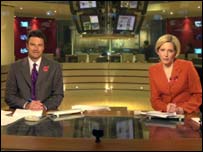The launch of the BBC's annual report on Tuesday is as much about the next three years and beyond as it is the performance of the corporation over the last 12 months.
The BBC's charter comes up for renewal in 2006 and its future, its funding and its role in general, is very much up for discussion and debate.
The broadcaster is currently facing more scrutiny than possibly at any other time in its history - and is under pressure from all quarters to justify its existence and the licence fee which primarily funds the corporation.
BBC chairman Gavyn Davies told a BBC News Interactive forum on Tuesday: "We are under more attack as an institution than almost any other institution in this country."
He was responsing to an earlier accusation by a Labour MP that the BBC's annual report was "Enron-like" in its "complacency".
 |
What is the BBC charter?
It lays out the independent, public service role of the BBC, its regulation and funding through a compulsory licence fee.
It runs for a 10-year period and expires in 2006
A new charter will be approved by the Culture Secretary
The last charter stipulated the licence fee should be fixed at 1.5% above inflation
|
The BBC is also under pressure from the government, not least because of the recent highly-public row with 10 Downing Street over the so-called "dodgy dossier," and also from the media - including its commercial rivals.
The growth in digital TV has fractured the BBC's traditional audience, who are asking questions about the need for a licence fee which funds services they either cannot receive or do not watch.
Jamie Cowling, research fellow at the Institute for Public Policy Research, said charter renewal would be a battle over how to maintain the benefits of a public service broadcaster in a much more competitive environment.
Reithian goals
He said the key issues to be debated and possibly fought over in the next three years would be how the BBC is funded and its role as a broadcaster in the digital age.
He said the government will be asking whether the Reithian goals of "inform, educate and entertain" still apply in the 21st Century.
Mr Davies told staff on Tuesday that the corporation would be arguing to keep the licence fee in place.
He said: "One of the things we shall argue in our case for charter renewal is that it would be a mistake in the national and public interest to reduce the scale and scope of the BBC.
"Once that is accepted, and I hope it will be, then it is difficult to find an alternative funding method that will support the activities of the BBC."
 |
New digital services
BBC Three
BBC Four
CBBC
CBeebies
Five Live Sports Extra
6 Music
BBC7
Asian Network (Sonia Deol, above)
|
He added: "We will be arguing against those who feel that we have extended our footprint too far and that we should be retracting from key areas like the web or digital television."
Protest
The corporation has faced a large amount of criticism in the last 12 months from commercial rivals concerned that the BBC is encroaching into their territory.
Mr Cowling told BBC News Online that the charter review process had to find an answer to the catch 22 situation in which the BBC constantly finds itself.
"The BBC is criticised if they make programmes that are not popular but are worthy, and it is also criticised if it makes programmes which reach millions of people," he said.
Director general Greg Dyke told the Commons culture select committee on Tuesday: "If you believe in the importance of British production and in the importance of a TV system that reflects our culture then the BBC becomes more important not less."
Charter renewal may be three years away but negotiations are soon to start and senior BBC management have been seconded to work on the project.

Spending on rolling news services has been criticised
|
Unfortunately, the negotiations are starting as relations between the BBC and the government are at their lowest ebb for 20 years.
"The outlook is not very good," according to an editorial in the Daily Telegraph, speculating that the BBC's funding formula of 1.5% above inflation was "unlikely to be renewed".
It said bluntly: "The BBC's problems are not financial, but political."
But Mr Cowling said he did not think the row with the government would have an effect on the charter review process.
"I'd be surprised if it had an impact," he said.
